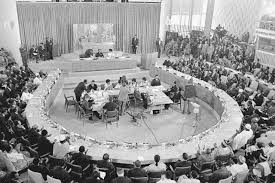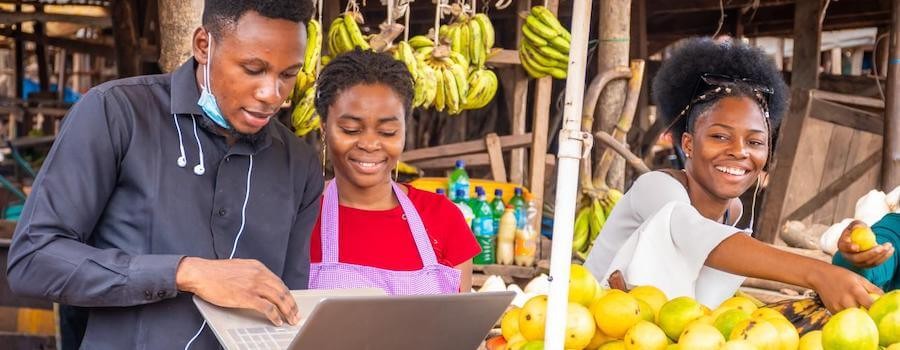A New World Order, An Old African Problem
The return of Donald Trump to the White House is no longer a matter of speculation; it is reality. His administration, known for its aggressive stance on trade, migration, and foreign aid, presents a complex challenge for Africa, particularly the African Continental Free Trade Area (AfCFTA). With threats of higher tariffs on global exports including that of allies, mass deportations of African migrants, and a drastic reduction in U.S. aid, the continent stands at a crossroads.
But this is not the first time Africa has faced such a moment.
In 1963, when the leaders of newly independent African nations gathered in Addis Ababa to form the Organisation of African Unity (OAU), they spoke of an Africa that would control its own destiny—politically and economically.
Ghana’s Kwame Nkrumah declared:
“The struggle against colonialism does not end with the hoisting of our national flags. It continues in the battle for economic liberation.” (Nkrumah, 1963).
Nigeria’s Dr. Nnamdi Azikiwe, a strong advocate for Pan-Africanism, echoed similar sentiments:
“There is no reason for Africa to remain divided. Political independence without economic unity is a mirage.”.
Sir Abubakar Tafawa Balewa, Nigeria’s first Prime Minister, also recognized the dangers of fragmentation:
“As Africans, we must recognize that our greatest strength lies in our unity. We must refuse to be tools in the hands of external forces seeking to divide us.”.
This dream became the Agenda 2063, passed down generations, materialised into the AfCFTA—a bold initiative to unite Africa’s economies into a single market, positioning the continent as a global economic force.
But in 2025, as global economic tides shift, Africa’s commitment to this dream will be tested more than ever.

#NotTooYoungToTrade: The Youth Must Own the AfCFTA
Africa is on the brink of a demographic revolution. According to the United Nations by 2050, the continent will be home to the world’s largest youth population, with over 60% of its people under the age of 25. If the AfCFTA is to succeed, it cannot be an agreement of bureaucrats alone—it must belong to Africa’s youth.
The Protocol on Women and Youth in Trade, adopted under the AfCFTA framework, is a vital step in ensuring that young Africans and women are not left out of the continent’s economic integration. This protocol:
• Eases access to markets for youth-led businesses.
• Reduces trade barriers for small enterprises.
• Provides incentives for young entrepreneurs in manufacturing, technology, and the creative economy.
However, policies alone are not enough. African leaders must actively engage young people through:
• AfCFTA mentorship and incubation programs that train young entrepreneurs in cross-border trade.
• Funding mechanisms tailored for youth enterprises, ensuring access to capital.
• Digital trade platforms that enable African youth to sell their products and services across borders seamlessly.
The message is clear: #NotTooYoungToTrade. Young Africans are not just the future—they are the present. The AfCFTA must be structured to empower them as the next generation of trade leaders, industrialists, and policymakers.

Changing ‘Japa to Bata’: From Brain Drain to Brain Gain
For decades, Africa’s brightest minds have sought opportunities abroad, a trend popularly known as Japa—the rush to leave in search of better prospects. The return of Trump threatens to disrupt this migration pattern. But instead of seeing this as a crisis, Africa must flip the script: Japa must become Bata—a conscious effort to bring back the best minds to build the continent.
Why is this important?
• According to the World Bank Africa loses over $4 billion annually in skilled labor migration.
• The continent spends millions training professionals who later contribute to foreign economies.
• Foreign economies benefit from African doctors, engineers, and tech talents while Africa struggles with shortages in these fields.
To change Japa to Bata, African governments must:
• Provide return incentives—tax breaks, funding, and land allocations for Africans willing to return and invest.
• Develop innovation hubs—incubators that allow African talent to create, innovate, and scale businesses.
• Create diaspora reintegration programs—ensuring returning professionals find opportunities instead of frustration.

Nigeria, in particular, must take the lead. With its vast diaspora community, the country should introduce the “Bata Fund”—a financial mechanism that supports returning Nigerians in setting up businesses in high-growth sectors like agriculture, technology, and manufacturing.
Africa cannot afford to keep exporting its best minds. If the AfCFTA is to be a game-changer, it must also be a catalyst for reversing brain drain. It’s time to turn “Japa” into “Bata.”
Nigeria: Africa’s Natural Leader in a Post-America First Era
Africa’s response to these challenges will define its future. And no nation is better positioned to lead this charge than Nigeria. As one of Africa’s largest economy, its most populous country, and a historical advocate for regional integration (see Abuja Treaty), Nigeria must seize this moment.
Concrete Solutions for Nigeria’s Leadership Role
Trade and Industrialization Strategy
• Nigeria must work with other African nations to implement policies that ensure African goods are processed within the continent before export.
• Policies should incentivize local manufacturing to reduce reliance on external markets.
• Special Economic Zones (SEZs) and Export Processing Zones (EPZs) should be expanded to facilitate intra-African trade.
Intra-African Financial Cooperation
• Establish an African monetary system that reduces dependency on the dollar and euro.
• Strengthen the Pan-African Payment and Settlement System (PAPSS) to facilitate cross-border transactions in local currencies.
• African banks must provide more trade financing options for small and medium enterprises (SMEs) to encourage participation in the AfCFTA.
Strong Trade Negotiations with the U.S.
• Nigeria and the African Union must adopt a common front in negotiating with the United States on trade matters.
African nations should use the leverage of their collective market under AfCFTA to demand fairer trade agreements.
The Future Will Not Wait
Trump’s second coming may be a storm, but Africa is not without shelter. The AfCFTA is more than a trade agreement—it is the vehicle for the economic independence that Nkrumah, Nyerere, Azikiwe, and Balewa envisioned. The question is: will we drive it forward, or will we let history repeat itself once again?
And like my boss Olusegun Awolowo will always say ‘Everything Africa needs for Africa is in Africa’.
It is time for Africa to act.
Source: This article was originally written by Joseph Ifeanyi Nwokedi for Connecting Nigeria Businesses newsletter


